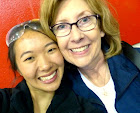
My second daughter, adopted as a baby from China, was a challenge to parent. She came to me with an awareness of her loss, memories of a woman she loved, a sensitive nature and an intense personality. My first three years with this beautiful and intelligent child drained me emotionally and physically. I learned what I had to do in order to help her with her adoption issues, and re-wiring my life, I did what was needed. I don't remember the details...but I remember being tired! And scared and anxious and resigned. We made progress together, but teaching a baby to love you is a lonely business.
My daughter grew to feel safe and secure in tiny little steps. I rejoiced in the smallest of things: her first unsolicited kiss at 15 months old almost stopped my heart! I spent most of my day, every day (and a lot of my nights) meeting her needs and teaching her to trust; it's hard to comprehend the immense amount of energy that can go into adoption-parenting, unless you're familiar with the bittersweet experience of bringing a child back from the edge.
I had a lot to learn about support systems, both for my child and for myself, and if I had to do it again I would be as proactive in finding assistance for myself as I was about finding resources for my daughter. I would help my family and friends understand the work I was doing with my child, and I would ask for their emotional support. I would let them know exactly what I was dealing with, and how important it was for them to put their arms around me and my baby, literally and figuratively. Adopting a child opened a whole new world for me, but I think I was too blurry-eyed to realize that my friends and family weren't sure of how to offer to help, or even what I was trying to accomplish. What had become second nature to me in doing attachment-work with my daughter probably made me look like a rigid and over-protective parent to an outsider, and probably made me appear unapproachable.
I wanted a coach, a mentor, a friend who understood--I needed the village that was supposed to help me raise my child! I didn't get the whole village, but I did find women who reached out to me, who extended sisterhood and who told me I was doing something valuable by mothering. They noticed. I held on to their words of honesty and support, and was enormously touched whenever another mom mentioned how well my little girl was doing. Simple words had a powerful impact:
"You are a great mom," my own mother told me one day, after watching me slog through months of attachment-parenting.
"You are a strong woman," an adoption therapist told me, which gave me the mantra to get through my week.
"We are so thrilled for her!" a group of moms told me with excitement when my toddler was finally able to sit happily on the play parachute at Gymboree. It was a big day when she decided to go for a gentle circle ride with the other babies, instead of clinging to me in fear. The moms' sincere celebration of my baby's big step forward surprised me; that they had noticed what my daughter was working to overcome, and had shared their appreciation of her accomplishment, meant the world to me.
More than time alone or bubble baths or even chocolate, the words and company of other mothers re-energized me to be the kind of parent I wanted to be. Moms who understood what I was trying to achieve, who acknowledged and validated my time with my daughter, were my cheerleaders. They gave me the words to go forward and the words that re-filled my inner reserve. I was, and continue to be, extraordinarily grateful for the women in my life who spoke up and reached out to me, who helped keep my attitude healthy and happy, and Who Noticed when I needed it most.
There is invisible strength in Motherhood, and
we need to watch out for one another. Giving a struggling mom a compliment, noticing the incremental progress of her child, or offering your encouragement (or shoulder to cry on) are not-so-random acts of kindness that fuel the thankless job of parenting. Showing up with a flat of flowers and planting them, dropping off a DVD and a bag of chips and dip, or simply sending an admiring email, are motherly gestures we can do for tired moms to help void the feelings of isolation that parenting challenging children can engender. We can
do this for each other; we can extend a hand, we can connect, we can all notice a mom who is in need of the essential, human magic of other mothers.
Jeanwww.AdoptionToolbox.comArtwork: Healing Hands by Silvia Hartmann
Copyright 2005 MacLeod, All Rights Reserved
Originally published as Women Who Notice: Speaking Up & Reaching Out; excerpted from Adoption-Parenting: Creating a Toolbox, Building Connections (2006 EMK Press)

















